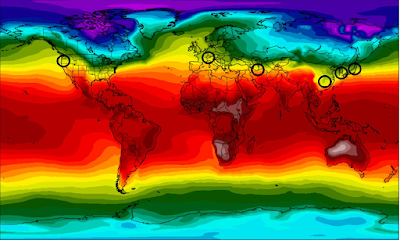Stephen Roney's Blog, page 250
March 15, 2020
Any Child Can Do It
An online resource for teachers recommends having younger students write poetry, because it is easier than prose. Poetry, they explain, does not need full sentences, or punctuation, or capitalization. Quite literally—this is the point of the teacher recommendation—any child can do it.
And in terms of contemporary poetry, they are right.
But this is also odd, because traditional poetry is extremely hard to write, far harder than prose.
So when we talk about modern poetry and traditional poetry, are we really talking about the same thing?
Seems instead that modern poetry is just prose without punctuation or grammar. Perhaps on an emotive theme.
And it is not surprising then if few any more are interested.'Od's Blog: Catholic and Clear Grit comments on the passing parade.
Published on March 15, 2020 07:20
Today's Reading
The woman comes to the well at noon.
This is unusual. The usual routine would be to go to the village well first thing in the morning, before the heat of the day, and get the water for your household’s daily needs.
The woman has instead waited until noon, making her labour more difficult, in the dry, hot climate, presumably in order to avoid meeting others. She is a social outcast.
And we know why; she is living with a man adulterously.
Jesus reveals her sins to her. As a result, she is able to access the true living water.
The story models the sacrament of confession.
'Od's Blog: Catholic and Clear Grit comments on the passing parade.
Published on March 15, 2020 07:00
Advice from the Leonard Cohen Facebook Group
Published on March 15, 2020 06:47
March 14, 2020
Coronavirus: A Portrait
Published on March 14, 2020 06:19
The Sins of the Fathers
 Orestes pursued by Erinyes.
Orestes pursued by Erinyes.“You shall no t make for yourselves an idol, nor any image of anything that is in the heavens above, or that is in the earth beneath, or that is in the water under the earth: you shall not bow yourself down to them, nor serve them, for I, Yahweh your God, am a jealous God, visiting the iniquity of the fathers on the children, on the third and on the fourth generation of those who hate me…”
Note this second part of the first or second commandment, depending on how you parse them. That makes it near the core of the Judeo-Christian message. It says that children and grandchildren are punished for a parent’s or grandparent’s sin.
Indeed, you get the same idea in the doctrine of original sin. Or that of redemptive suffering. One person can suffer for the sin of another.
And it is troubling: how can an all-loving God be so unjust? How can he punish Tom for Jerry’s sin?
Nevertheless, we have to accept that this is a fair description of reality. All of us either suffer or benefit from actions of our ancestors; these inform the circumstances of our birth and upbringing. Since God could intervene to prevent this, he is ultimately responsible.
But there must be more to this, too.
For this then is a case of God taking direct responsibility for human sin. Which is not theologically correct. We have free will.
And if a parent is morally depraved, it is probably not going to change their mind to hear that their children will suffer for it. That would trouble only a good person. In fact, this is what a narcissistic parent actually wants and tries to do. They inevitably choose one or more children as a scapegoat, and blame and punish them without cause. Most often, they are innocently punished for the very things of which the parent is guilty. That is what “scapegoat” means.
So it seems both false and fruitless for God to declare this commandment to the bad. And after all, if they are idolators—the specific sin which this commandment prohibits—they are not listening to God in the first place.
Nor to the already righteous parents, who care about their children. They are, after all, already righteous, and listening to God, not worshipping idols.
It has to be that he is speaking to someone else.
It has to be that he is speaking to the children. He is speaking to the grown children of the iniquities of their fathers.
Children, especially less thoughtful children, get their worldview and many of their unexamined opinions from their parents. Denominational beliefs, politics, and prejudices of all kinds run in families for generations. This is demonstrated often in demographic surveys, were it not self-evident. In our earliest years, our parents are the font of all knowledge; and this assumption never entirely fades.
Yet we all also have an innate conscience, from God, and must be conscious as well of contradictions, between this and what our parents taught us. And we all have a moral duty to actively seek the True and the Good.
It is perhaps vitally significant that this passage comes at the end of the prohibition against idolatry.
The essential and most dangerous idolatry may be this idolatry of the parent; and what Francis Bacon called “the idols of the tribe.”
The word translated here as “iniquity” is actually closest to the English “crookedness.” It is an image of a thing being bent.
That indeed makes it plausible that it refers to a distorted, dishonest world-view.
And it seems to bookend with Jesus’s condemnation in the New Testament of those who would “cause one of these little ones to stumble.” It is a condemnation of parents who fail in their children’s moral education.
One can see, then, how this commitment to sin is both passed down from the parent, and a matter of personal responsibility. We all have the moral obligation to see past such idolatries—this is what the commandment is telling us. If in an oddly oblique way, as if aware of the necessity at the same time not to upset the authority of the family—the foundation of all social order.
Happily, this conflict between God and parent is not great in most families. However, one can easily see in it the basis for original sin. Every human ancestor must, like Adam, fall somewhat short.
A similar concept of guilt running in families was known to the ancient Greeks. See, most obviously, the Oresteia trilogy: it ends in a formal trial, in which by the grace of Athena the parent is found at fault, and the child not guilty. Plato too speaks of ancestral curses for which a descendant must atone, through bouts of “divine madness” and through rituals of purification.
Plato is referring to melancholy, which is much of what we call mental illness; or at least to depression and mania (now “bipolar disorder”). In the Oresteia, the same experience is represented by pursuing Furies. This, depression, then seems to be a product of the dissonance between parental influence and eternal verities.
But those raised by a narcissistic parent who do not suffer through the ordeal remain in sin. They have broken the first commandment.
'Od's Blog: Catholic and Clear Grit comments on the passing parade.
Published on March 14, 2020 05:57
March 13, 2020
A Way to Avoid the Coronavirus?
 Virus epicentres mapped to mean daily temperatures.
Virus epicentres mapped to mean daily temperatures.An enduring mystery of the coronavirus is why it has not yet run rampant in the Philippines.
Filipinos are gypsies. They are working in large numbers in all the other countries of the region, some of which have been hard hit—not to mention being most of the crew on most cruise ships. Because home is near, in East Asia they are always flying in and out—it is not unusual to fly in to Manila for the weekend. The Philippines also had, as I recall, the first confirmed case outside of China. Yet the numbers are still small, and there has been no confirmed community spread.
Another why has the virus been so much more disruptive and deadly in Italy than it has been in South Korea? South Korea got it sooner, and things looked desperate. But the number of new cases has levelled off, and there have been far fewer fatalities.
Wait, there’s more. Why did Vietnam and Singapore, close to China and with so many connections, have a rash of early cases, but the victims seem to recover, and not to spread; while Iran, much further away from the Chinese epicentres, and with much less commerce in that direction, explode with serious cases?
I speculated this was because of better social cohesion in the face of disaster.
But now someone has come up with another explanation, that seems to me to make sense. The places where the virus has been particularly successful at spreading, they discover, lie along a narrow band of latitude. Or more specifically, of temperature and relative humidity. These scientists suggest that the virus needs a steady temperature of 5-11 degrees Celsius and 47-79% relative humidity to spread. All the most affected areas share these parameters.
This makes sense in terms of what we know about viruses. They commonly die back in summer. They commonly thrive only within particular climactic parameters.
So why has the virus stopped spreading so swiftly in South Korea? It may not be that South Korea’s containment measures are so successful. It may simply be that the temperature is getting higher as spring takes hold, putting them on the fringe of the virus-fertile zone.
If this is right, and it looks right, this is good news. It suggests the virus may go dormant throughout the northern hemisphere over the next few months. Buying us all some valuable time.
The bad news is that southern Canada is about to move into the kill zone.
But even so, spring in northern climes may not be that favourable to the virus, as the temperature is not steady day to day, and changes quickly.
And if we can aggressively delay its spread, we might hold it back until the warmer weather comes.
In the meantime, this suggests a useful strategy for retirees, those most vulnerable, or those who actually have the virus and are in self-quarantine, to avoid infection. Check the temperature and humidity daily. If they are within the danger zone, postpone any errands. If they are out of the danger zone, it may be quite safe to venture outside.
'Od's Blog: Catholic and Clear Grit comments on the passing parade.
Published on March 13, 2020 08:19
March 12, 2020
Eastern Civilization and Western Barbarism

When I teach young Chinese students, they always seem familiar with the classics of the West. In a recent class, I asked each, “what’s your favourite book?” The first student said “Tom Sawyer.” The next said “Little Red Riding Hood.” They can all recount the story of the Three Little Pigs, or the Tortoise and the Hare. Another was working on an essay on "The Little Mermaid." The Andersen story, not the Disney movie.
I recently signed on to help American students with their high school English Lit homework, and find I cannot. Despite two degrees and most of a doctorate in, essentially, literature. They are all reading recent novels which I would have to read myself in order to advise them.
No doubt North American kids are getting a good taste of the classics outside of school, if in a distorted form: from Disney and other forms of popular entertainment. But we really should be teaching the original versions in school. Obviously, the kids would be interested—this is just about what they are most interested in, according to the box office. Aside from the fact that they teach vital life lessons, these are, after all, the best stories available.
And sometimes versions of the classic stories do appear in North American texts. When they do, however, it is always a modern retelling intended to subvert the original. One classic example I encountered recently was The Boy Who Cried Wolf told from the perspective of the wolf. Who was, of course, a vegetarian.
It almost looks as though the future of Western civilization is in China; or in the Far East. Perhaps also in Eastern Europe.
It is encouraging to know, at least, that it will survive somewhere.
And perhaps this is a good thing. “Western civilization” was always a bit nonsensical as a term. Civilization is civilization. Its centre is perhaps shifting.
'Od's Blog: Catholic and Clear Grit comments on the passing parade.
Published on March 12, 2020 09:00
March 11, 2020
Some Straight Talk
On the coronavirus, from The Atlantic.'Od's Blog: Catholic and Clear Grit comments on the passing parade.
Published on March 11, 2020 11:32
Lights Are On ...
Some of Biden's odd gaffes.'Od's Blog: Catholic and Clear Grit comments on the passing parade.
Published on March 11, 2020 11:07
Welcome to Hiroshima

Things are heating up fast on the coronavirus front, for Europe and America. A doctor has described the Italian situation as “like an explosion.” Canada has so far been lucky, but surely will not be lucky for much longer.
The jurisdictions of East Asia, although they were first hit, seem to have handled the outbreak well. China, after its original fumble, now seems to have things increasingly under control. Hong Kong, South Korea, Japan, Singapore, Vietnam, Taiwan, Macao—all doing relatively well, in the circumstances.
I nevertheless naturally assumed that, if and when it reached Europe and America, the thing would be handled much better. Better infrastructure, bigger budgets, higher levels of public trust and trust in government, greater medical expertise, better organized, and so forth.
So far, it does not look to be so. Despite having the previous experience of East Asia to inform them, Italy seems to have managed to react little better than chaotic Iran. The death is alarming, the spread seems uncontained, hospitals are beyond capacity. The comparison on each of these points with South Korea, which got the virus earlier, is striking.
Now, even with this Italian example, other governments in Western Europe and the USA seem to have been disorganized and slow to react. The USA apparently has a critical shortage of test kits. It is almost impossible to get tested for the virus even if you have symptoms. Large public meetings and regular flights have mostly continued. Worse, in the US, Britain, and the Netherlands, government sources seem to be actually spreading objectively false information that minimizes the risks.
You may think I myself am overacting. Time will tell. But it seems to me that in Italy, time has already told.
Aside from East Asia, some other countries seem to have taken the virus very seriously and to have responded energetically: Russia and Eastern Europe have, in general, shut borders, and this has been effective so far. Israel has banned all flights.
Why the difference? I had suggested it was cultural yesterday, but perhaps it is not even that. There is not such a big cultural difference, surely, between Eastern and Western Europe.
I think it tells us something about human nature.
The difference is perhaps that Western Europe and the USA have had things pretty good for a pretty long time—since the Second World War and aftermath, say. For most of us, that is now beyond living memory. The governments and people of Eastern Europe, East Asia, or Israel, while they might be doing well at the moment, have known harsher times more recently.
This makes them better at recognizing a real threat, and mobilizing for it.
The Americans and the Western Europeans will find denial easier. Why take measures that might hurt the economy? It’s not as if bad things ever really happen, is it? It can’t happen here.
And, not accustomed to taking hits, any inconvenience in the meantime seems to the average American or Parisian unacceptable. Better to deny and hope it all goes away.
People have a natural tendency to cover their ears to real bad news; bad news that doesn’t just happen to others. To refuse to see either danger or evil when confronted with it. After all, hearing bad news makes you feel bad. Churchill once said: “Men occasionally stumble over the truth, but most of them pick themselves up and hurry off as if nothing ever happened.”
He credited his own ability to see the true menace of Hitler to his experience of depression.
Orwell too considered his primary talent to be the ability to admit truth, as most men cannot. He wrote “To see what is in front of one’s nose needs a constant struggle.” He, too, suffered from depression, due to an abused childhood in a public school.
This reveals an interesting law of nature: the poor are likely to be saner than the rich. Those who have suffered are likely to be saner than those who have been lucky in life. Jesus more than hints in the Beatitudes. The poor and the oppressed are those most apt to keep up the constant struggle to see what is in front of their noses. Circumstances have forced them to it.
I think I have seen this myself, consistently.
It is bizarre therefore that we classify “depression” as a “mental illness.” The depressed are in fact the sanest among us. Great minds are always depressed, as Aristotle or Plato said and knew. It is perhaps an emotional disorder, but it is the opposite of a mental disorder in the common sense.
'Od's Blog: Catholic and Clear Grit comments on the passing parade.
Published on March 11, 2020 08:31





